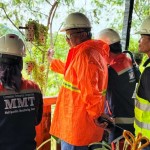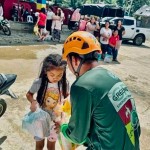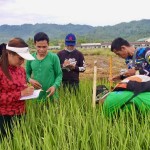Canatuan security personnel participate in human rights training
Rufino Sapian never passes up the chance to attend skills training sessions and seminars. He considers them as excellent opportunities to improve his knowledge and skills, especially if they relate to his job as a member of a security group assigned by the Armed Forces of the Philippines (AFP) to protect Canatuan. Canatuan is the ancestral domain of Subanon indigenous tribe to which he belongs and host to the copper-zinc mining operations of TVI Resource Development Philippines, Inc. (TVIRD). Sapian’s motivation to learn stems in part from the fact that he was not able to finish high school, owing to a cycle of poverty that, before TVIRD came, had plagued his village in this mountainous eastern portion of Siocon, Zamboanga del Norte.
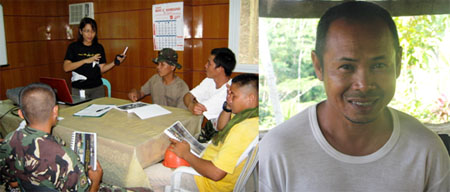
|
In left photo Rocelle Magpayo of TVIRD’s CReDO unit (standing) conducts human rights training among members of the SCAA unit assigned by the AFP to protect Canatuan. At right photo is Rufino Sapian. “The training will always remind us that maintaining safety and security in Canatuan should be done within the framework that ensures the respect of fundamental rights of people.”
|
Recently, Sapian participated in a seminar and training on the Voluntary Principles on Security and Human Rights (VPSHR) along with four other members of the AFP’s SCAA unit in Canatuan [“SCAA” means Special (Citizens Armed Forces Geographical Unit) Active Auxillary]. The seminar, run by TVIRD’s Community Relations and Development Office (CReDO), seeks to emphasize among security personnel in Canatuan the importance of the protection and promotion of human rights as TVIRD conducts its business in the area, as well as the important role of civil society groups and local government units in advancing these goals.
TVIRD was a leader in the Philippine mining industry in the use of the VPSHR as its guiding framework for the management of its security needs.
According to Rocelle Magpayo, CReDO Program Officer, the VPSHR training is being conducted for all SCAA personnel “because TVIRD has a commitment to its host and impact communities to have an effective, but human rights sensitive security service.”
“Respect for human rights has been incorporated in training sessions that we’ve conducted for SCAAs in the past,” Feliece Yeban, TVIRD Vice President for Social Commitments, explains. “The one we are conducting now to all members of the force, however, is more comprehensive as they are taught about how to address different situations effectively in relation to peace keeping and in securing the community and company assets, be they human or material. For example, in a situation where a company employee and a Canatuan resident are involved in a fight, SCAA elements are taught to react in ways that will not violate the human rights of those involved.”
Yeban says the training consists of a series of workshops for small groups of five that will run until December 10, in time for the celebration of the Universal Declaration of Human Rights. This format will enable all members of TVIRD’s security force to undergo the training.
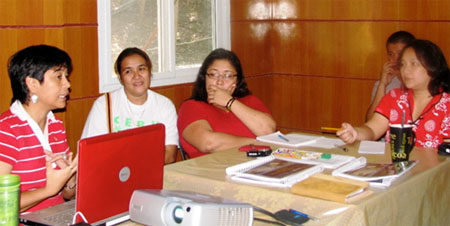
|
Feliece Yeban, TVIRD Vice President for Social Commitments (extreme left), during the curriculum planning for SCAA personnel. Others in photo are (from right) Elvie Asuan, guest lecturer; Noelle Nazareno, CReDO Communications Specialist; and Julma Ismali, CReDO Community Relations Officer for Siocon. “TVIRD has a commitment to its host and impact communities to have an effective, but human rights sensitive security service,” Yeban says.
|
For his part, Sapian says he appreciates TVIRD’s efforts in holding seminars like the VPSHR. “To indigenous people like me, the VPSHR will always remind us that maintaining safety and security in Canatuan should be done within a framework that ensures the respect of fundamental rights of people. Otherwise, the benefits that we get from mining would amount to nothing if we in the security force will be accused of violating people’s rights, especially from the people whom we are sworn to protect.”
Magpayo adds: “We cannot deny that players in the extractive industries such as mining and oil and gas here and abroad have always been accused, rightly or wrongly, of human rights violations in communities where they operate. This explains why we consider the conduct of VPSHR seminars for SCAAs as a crucial component of our security and community relations initiatives. Human rights principles have so far been helpful in strengthening TVIRD’s relationship with its host and impact communities because expectations are well defined and acceptable behavior is clearly set.”
Tribal leader Fred Limbang says he is satisfied with the way the SCAAs have been doing their job. He points out that the ongoing training will boost the SCAAs’ morale and performance because they will know how to deal with different situations. He recalls the time in 2002 when the tribal leaders of Canatuan requested the AFP to allow them to have a security force that would assist the Philippine Army in maintaining peace and order in the community. This was after bandits ambushed some members of the community while they were on the way to Siocon town proper. “We owe the peace and security we are now enjoying to the support of the AFP and its SCAA unit here,” he says.
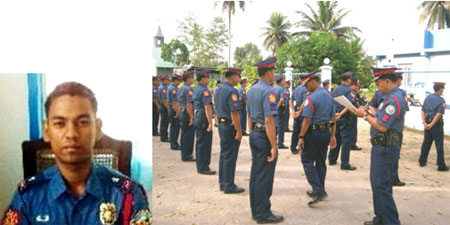
|
Siocon Police Chief Kishna Asaalih (left photo), a Tausug Muslim, inspects his men (right photo).“We found an effective partner in the SCAA whose peacekeeping activities are appreciated not only in Canatuan but also in the adjoining villages,” he says. |
Police Inspector Kishna Asaalih, Siocon police chief, describes the SCAA as a disciplined security force. “I consider it as an effective partner of the town’s police department in maintaining peace and order condition in the whole town. Siocon has 26 barangays and it is difficult for us to cover the entire municipality, owing to the rugged terrain of hinterland barangays like Tabayo and its sub-village, Canatuan. But we found an effective partner in the SCAA whose peacekeeping activities are appreciated not only in Canatuan but also in the adjoining villages,” he says.
Bebie Hamoy, a store and eatery owner in Canatuan, agrees with Asaalih: “Without the SCAAs Canatuan would not be as peaceful as it is now. Business has been good here. We have customers who are employees of TVIRD and its contractors. It won’t be like this if the community is not peaceful.”
Sapian says the staff development program that brought forth the VPSHR seminar has been a great help in ensuring that he and his colleagues in the SCAA are doing their job effectively. “Thanks to the AFP and TVIRD,” he stresses, “seminars like VPSHR can offset many of the things I wasn’t able to learn because I had to drop out of school.”
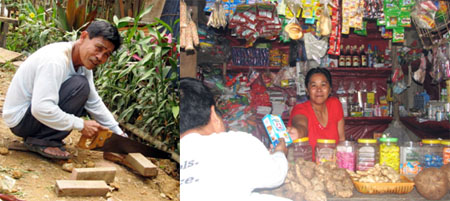
|
Left photo shows Fred Limbang, a Subanon tribal leader. In right photo is Bebie Hamoy, a Canatuan entrepreneur. Both say that without the SCAAs Canatuan would not be as peaceful as it is now.
|
He has attended the Mountain Search and Rescue (MOSAR) training aimed at equipping the SCAAs with skills to respond to calls for assistance in times of calamity, natural or man-made. He takes pride in learning CPR and in rescuing people who have fallen in deep ravines or into rampaging rivers. Sapian also took up refresher courses on peacekeeping under the AFP, as well as Sustainable Agriculture Land Technology (SALT) training conducted by TVIRD Mill Operations Superintendent Rey Carubio, who taught SCAAs the proper techniques of hillside farming. Sapian wants to preserve the lands he inherited from his ancestors. He dreams of putting to good use everything that he has learned about farming at the end of TVIRD’s mining operations in Canatuan.
Mustering a smile, Sapian sheepishly says that if only he can have it his way, he will make TVIRD stay longer, adding that he has a daughter whom he wants to finish a college degree that he failed to attain. Sapian proudly tells his colleagues that he was one of the Subanons who petitioned Philippine President Gloria Macapagal-Arroyo to allow TVIRD to operate in Canatuan because they believed — rightfully so, he says — that responsible mining can bring progress to their ancestral domain.
“It is not true that mining will bring more harm than good to the lumads (indigenous people),” he stresses. “It is simply not true. As you can see, we are now reaping what we have sown. Our children now have access to education and health services; our women to sustainable livelihood. We are gradually gaining the capacity to chart our own course in our own homeland. And we are doing so fully aware of our rights and those of the people around us.” (Lullie Micabalo)

